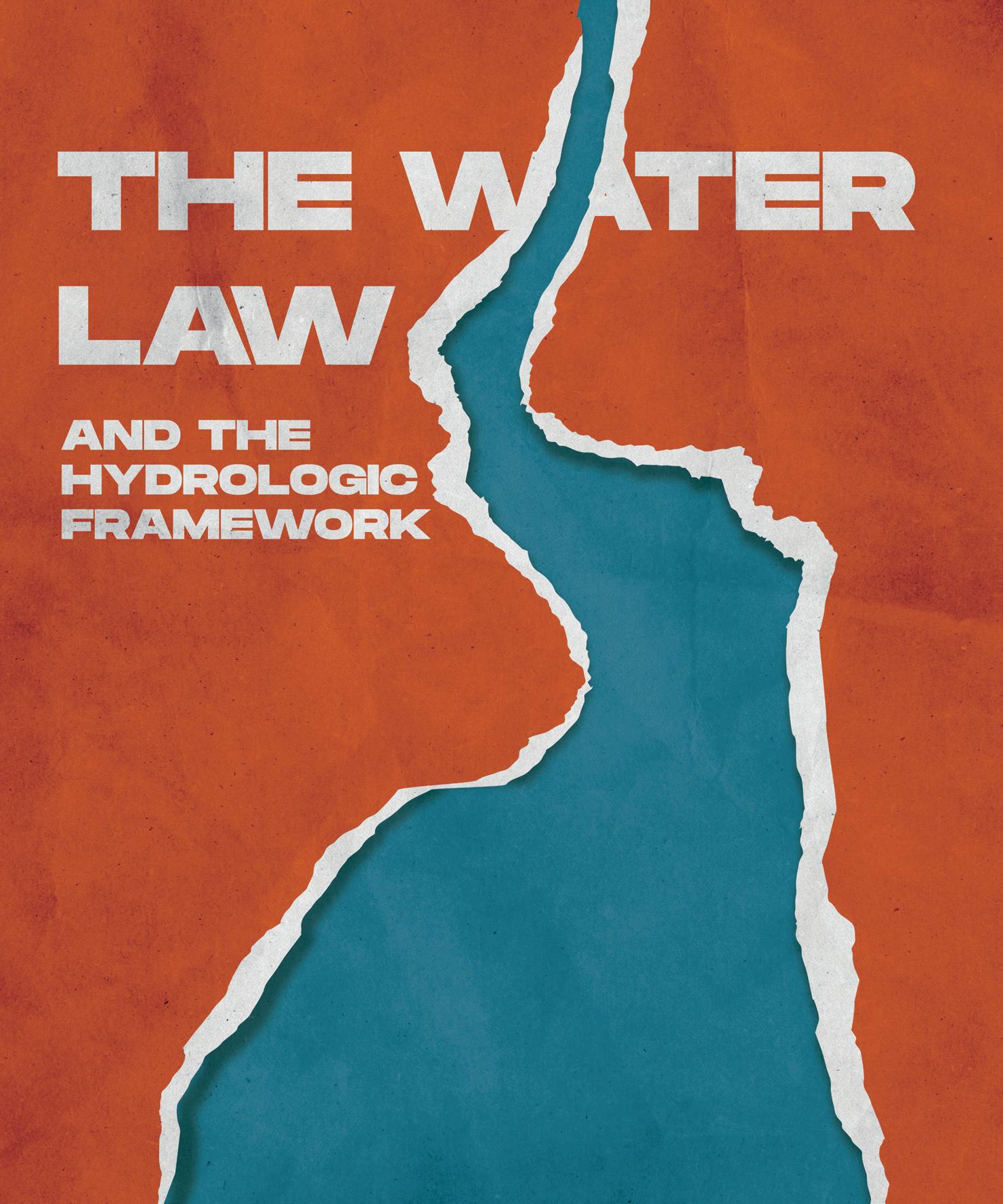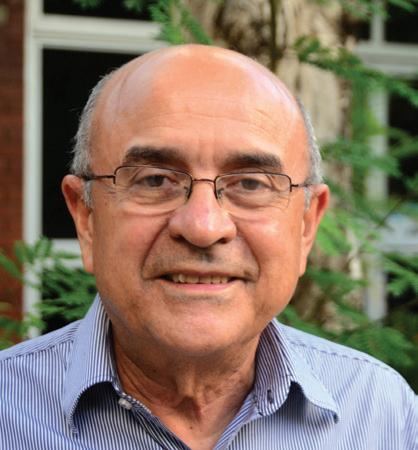
7 minute read
Legislation
As it turns 25 years old, Law No. 9,433/1997, considered one of the most comprehensive in the world in terms of water management, is at risk of being surpassed by a federal government project, currently being considered by Congress, that threatens the social achievements made over a quarter of a century.
By Hylda Cavalcante Illustration: Clermont Cintra
25 years ago, the Water Law, known as Law no. 9.433/97, was sanctioned. The new legislation, which was the result of significant social mobilization, represented a true revolution and was considered one of the most complete in the world in terms of water management. Among other advances, it established the National Water Resources Policy (PNRH), established instruments for the management of federal water resources (rivers that pass through more than one state or border), and created the National System for Water Resources Management (Singreh). However, this vital law is now at risk of becoming a legend, as the Brazilian Congress is currently considering a federal government project proposing a water framework for Brazil. According to experts, the project goes against the Water Law.
It was legislation that aimed to establish a national pact,” explained environmentalist Samuel Barreto, national water manager for The Nature Conservancy (TNC) Brazil and member of a United Nations (UN) water working group. “This pact was established based on the definition of guidelines and public policies aimed at improving the supply of water, in terms of quality and quantity, managing demands and considering water as a structuring element for the implementation of sectoral policies, from the perspective of sustainable development and social inclusion.”
The opinion is unanimous: any proposal to update the current legislation should go through a consultation process with the population, as happened in the years leading up to the enactment of the Water Law. Brazil is on the Olympus, privileged with 13% of the world’s freshwater resources. An immeasurable wealth, as scientists already warn of the worrying scarcity of water resources in the world. According to Barreto, the National Water Resources Policy (PNRH) established a decentralized management of river basins, as well as the participation of society through Basin Committees. “More than that, it brought important foundations such as the understanding that water is a public good endowed with economic value,” he emphasized.
From the Water Law, a system was established. Watersheds became planning units, with management focused on promoting water conservation and multiple uses. Integrated participation of government, users, and society was also established in decision-making. To complete this system, the National Water Agency and Basic Sanitation (ANA) was created in 2000. Today, there are over 230 Watershed Committees in the country, which gather sectoral interests of the national and transboundary basins and micro-watersheds. “The Water Law was a conceptual change for the sector in the country,” Barreto emphasized.
He points out diverse examples that both the national and state water laws, with their management bodies, councils, watershed committees, and agencies, have promoted achievements in reducing and managing conflicts over water use. One of them concerns the Northeast and translates into negotiated water allocation mechanisms in the region. Another example occurred in São Paulo during the state’s worst drought, in 2014 and 2015. After studies and debates with the population, it was understood that resources had to be applied to sanitation actions to improve river quality. The Jundiaí River went from a class 4 water river (considered a dead river) to a class 3 river, helping to promote population supply.
“We also had important guidelines for improving water quality in rural areas, with investments in sanitation systems and incorporating nature-based solutions (NbS) such as forest restoration, in the recovery and conservation of watersheds,” said the environmentalist.

Dark horizon
The consequence of this process of water use consolidation in Brazil was the creation, in 2017, of the Water Governance Observatory (OGA) - a multi-sector movement with about 60 institutions and 17 researchers that monitors water governance and suggests improvements. For the coordinator of the Regional Consultative Chamber (CCR) of the Lower São Francisco of the São Francisco River Basin Committee (CBHSF), Anivaldo Miranda, these 25 years of the Law should be celebrated. “After a quarter of a century of this achievement that was the National Water Law, which I consider the best law ever for its strategic vision of the future, unfortunately, we will celebrate under a scenario of very heavy clouds, a scenario of great threats to the continuity of this law,” he said.
According to Anivaldo Miranda, the Bill No. 4.546/21, drafted by the Ministry of Regional Development (MDR), which has been under consideration in Congress since January, “represents a true blow against what has been built in the last 25 years in terms of public water management, and the central target is the heart of the Water Law.”
Luciana Khoury, a prosecutor for the State Public Prosecutor’s Office in Bahia, also supports the current legislation. In her opinion, “there is no environmental management or water management without social control and participation.” For the prosecutor, it is important to note that the National Water Law guides everyone to have guidelines and principles that speak of decentralization, basin-based management, guided by planning. “Our interpretation of the legislation needs to have this systemic view,” she warned.
The experts do not dismiss weaknesses in the legislation. “It is true that the Water Law is not perfect and needs improvement. However, the lessons learned in mitigating water risk show that good results have been achieved through leadership, collective action, pragmatism, and good water governance based on the principles, foundations, and instruments of this Law. That is why it is so important that the current law be improved, strengthened, and not weakened”, said Samuel Barreto. He advocates for the strengthening of the law “through the adequacy of the official functioning structures of the Water Resources Systems; the expansion of the capacity of the managing agencies; the provision of a minimum structure for the functioning of the Basin Committees, with their well-prepared representatives; the improvement in the production and systematization of technical information that supports better decisions among the different entities that make up the system”.
He also suggests the implementation of water resources management instruments, the stimulation of municipal participation, and a “widely informed and mobilized” society.
“Water management represents a great opportunity due to its power of integration and its impact on all segments of society. Brazil still has a good Water Law, which needs to be understood and defended before public opinion and the National Congress”, emphasized Barreto.
Economic power
For Anivaldo Miranda, the main problem for the application of the law has been the resistance made by economic power over time.

“The Law No. 9.433/1997 was a great advance, but economic power resists the application of legislation, not to mention the bureaucracy of the State. The main aspect to demonstrate this is the water management instrument. Unfortunately, watershed plans do not come off paper, the water use authorization system is not established and sparsely implemented in the country. The charge for the use of raw water is not equal to the charge for the use of treated water, there is a huge difference,” he complained.
Prosecutor Luciana Khoury, on the other hand, highlighted, among the weaknesses of the current legislation, the need for greater participation of traditional communities. “The expulsion of peoples and traditional communities from their places of origin has brought even more impacts on the environment. There is no way we can deal with water management without addressing the guarantee of traditional peoples in their territories,” she commented. “The more we have the presence and respect for our peoples and their territories, the more we will have the guarantee of protection of water resources, and for that it is necessary to rethink water management instruments.”
For the prosecutor, “it is extremely necessary that we be protected by legal security, and for that we need to respect what the legislation commands. All of us have to ensure that as citizens.”
When it comes to increasing social participation, according to Anivaldo Miranda, there is a fundamental issue: the strengthening of the Basin Committees, with the implementation of the charge for the use of raw water. Without money in the bank, these Committees cannot expand their activities. If the legislation is to be changed, let it be towards improving management instruments. And not towards a proposal that undermines everything that has been built with so much social struggle.
“There is a struggle to establish a charge for the use of raw water throughout the national territory. This is paramount,” said Anivaldo Miranda. “Let the money be delivered to the Basin Committees that represent users, civil society, and the government. The intention is to do the minimum amount of work because our rivers are abandoned and our land, which is equivalent to our body, is being trampled on due to a lack of governance.”
What is the Water Law:

It is Law No. 9,433, sanctioned on January 8, 1997. It instituted the National Policy on Water Resources (PNRH) and created the National System of Water Resources Management..
How it was before its existence:
Until then, the legal protection of Brazilian waters followed a similar path to environmental protection: it happened indirectly. Water was accessory to other interests, so its use was determined by economic and sanitary norms, or related to property rights.
The law prior to this legislation: National Policy:
Water in Brazil was still treated as a commodity when it became the subject of its own legislation, the Water Code of 1934. It was only with the 1988 Constitution and later the 1997 law that the recognition of the need to protect water within the overall environmental structure and to manage it in a way that integrates water resources with the environment to ensure sustainable development and the maintenance of an ecologically balanced environment.
Multiple uses:
The law, in its article 1, lists the main principles of the National Policy. There, it is understood that water is a public good (it cannot be controlled by private individuals) and a limited natural resource, endowed with economic value, but it must prioritize human and animal consumption, especially in situations of scarcity.
Role of the State:
The legislation establishes that water must be managed in a way that provides multiple and sustainable uses (supply, energy, irrigation, industry), and this management must be decentralized, with participation from users, civil society, and government.
The Committees:
According to the law, the State shares an active participation in decisions with various segments of society. It is up to the Union and the states, each in their respective spheres, to implement the National System of Water Resources Management (Singreh), legislate on water, and organize, based on the hydrographic basins, a system for managing water resources that meets regional needs.
Within Singreh, the government, organized civil society, and water users are part of the Basin Committees (CBH) and work together to define and approve policies on the water resources of each hydrographic basin. Also part of the system are the National Water Resources Council, the National Water Agency (ANA), the Water Resources Councils of the States and the Federal District, the agencies of the federal, state, district and municipal public authorities whose competences relate to the management of water resources, and the Water Agencies, advisory bodies of the CBHs.
By Luiza Baggio










